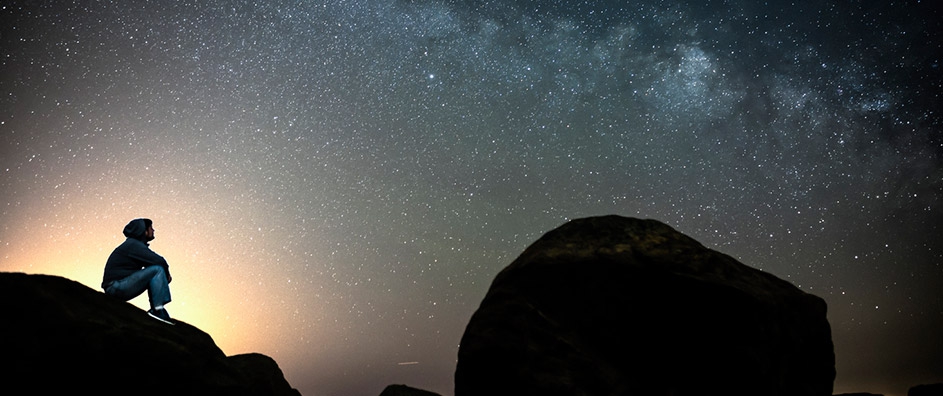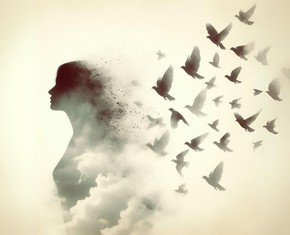The views expressed in our content reflect individual perspectives and do not represent the authoritative views of the Baha'i Faith.
As a child, I would always pick the window seat—the wonder of looking at the clouds like a siren call that would never leave me—but this trip was different.
I found myself in a more thoughtful mood, and as I looked out from the airplane at the vast expanse below, the sunset right behind us, feeling this shaking big metal tube moving us through the air, it all seemed so real and beautiful, almost heavenly.
I thought, if I am awed by looking at this physical world, how beautiful must the next world be?

If you believe in the after-life, you know those are real worlds too, but you can’t perceive them in the same way. In this world I can see, touch, hear, and everything seems quite real and substantial, so we generally discount the next world as fantasy or not real. But is this physical world substantial and as real as we think? I’m an attorney by training, but I love science and know just enough to be dangerous when trying to explain things I have read or seen.
I’ve noticed that a few scientific findings keep coming up the more and more I read: that we don’t know where consciousness truly resides, that we perceive things in many forms (direct observation, dreams, or experiencing what others do through stories) and that reality itself is not what we think it is. We haven’t quite gone all the way through these rabbit holes yet, but we can begin getting glimpses that there is a consciousness, even if we haven’t found where, and that our true self resides there.
The son of the founder of the Baha’i Faith, Abdu’l-Baha, states that “The reality of man is his thought, not his material body.” This makes so much sense, when you think of dreams that can be as real as this physical world, only to be fully aware that it was actually a dream when you wake up. Even when we see movies, scientists say that our brains perceive what’s happening on the screen as reality and activates the same areas of our brain as if we were sharing those same experiences.
There is one finding that has puzzled me more than any other: how truly empty this physical world really is, even without taking into account the vast empty universe. When we look at this matter that seems so substantial, it is really mostly empty space. In fact, the deeper we go into matter the more empty space we find. Everything we see is 99.9% space, from those thick clouds outside my window to my hand, to this big metal tube. When you “look” inside every atom, it’s mostly empty space, with something smaller inside that is also mostly space. All this reminded me of a quote from the Baha’i writings that put it all in perspective:
Know thou that the Kingdom is the real world, and this nether place is only its shadow stretching out. A shadow hath no life of its own; its existence is only a fantasy, and nothing more; it is but images reflected in water, and seeming as pictures to the eye. – Abdu’l-Baha, Selections from the Writings of Abdu’l-Baha, p. 178.
This also made me think that maybe the Kingdom of God, these spiritual worlds, are not as far from us as we think. If this physical world is nothing but empty space and images reflected in water, then the image must be connected to this world–the mirror interacts in some way with the object that is in it.
The Baha’i writings actually address this fact and talk about spiritual worlds being “closer to man than his life-vein.” But even as close as these spiritual worlds may be, our understanding is so limited. What gives me great comfort and makes the most intuitive sense to me is Abdul-Baha’s description of our own journey to the next world:
To hold that the spirit is annihilated upon the death of the body is to imagine that a bird imprisoned in a cage would perish if the cage were to be broken, though the bird has nothing to fear from the breaking of the cage. This body is even as the cage and the spirit is like the bird… Therefore, should the cage be broken, the bird would not only continue to exist but its senses would be heightened, its perception would be expanded, and its joy would grow more intense. – Abdu’l-Baha, Some Answered Questions, newly revised edition, p. 262.
The Baha’i teachings ask us to meditate on the next world, as it reminds us of our true reality and purpose in this life.
So as I contemplated the clouds, I couldn’t help but see the beauty of nature, and also imagine how even more wondrous God’s spiritual worlds must be. How much more real to truly perceive things with our entire essence, to feel more deeply, to see others and connect at a deeper level. This is why we are not fully shown the reality of the next world, or who would want to stay here? Yet we have a purpose in this world, too, which Baha’is believe is but a small part of the life that is eternal. We’re here to live a life that will stretch into eternity, for which we must prepare purposefully and perseveringly.
You May Also Like
Comments

















Thank you sir for your perspective of this life and the life to come which reinforce my understanding since i became a Baha'i in April 1967 and did realise the unfettered search after truth as i went deeper in the Writings of The Beloved Bab, Baha'u'llah, Abdu'l-Baha and Shoghi Effendi and the writings of the followers of Baha'u'llah which emphasize on the Independent search after truth as i read the Hidden Words which says: O SON OF SPIRIT! The best beloved of all things in My sight is Justice; thank you Allah'u'Abha!